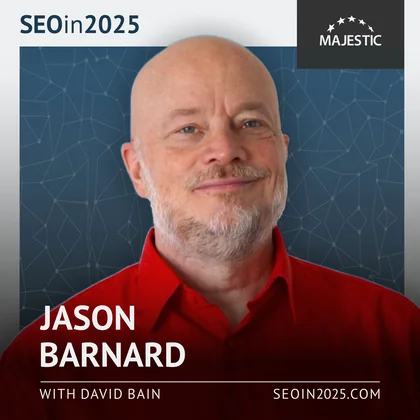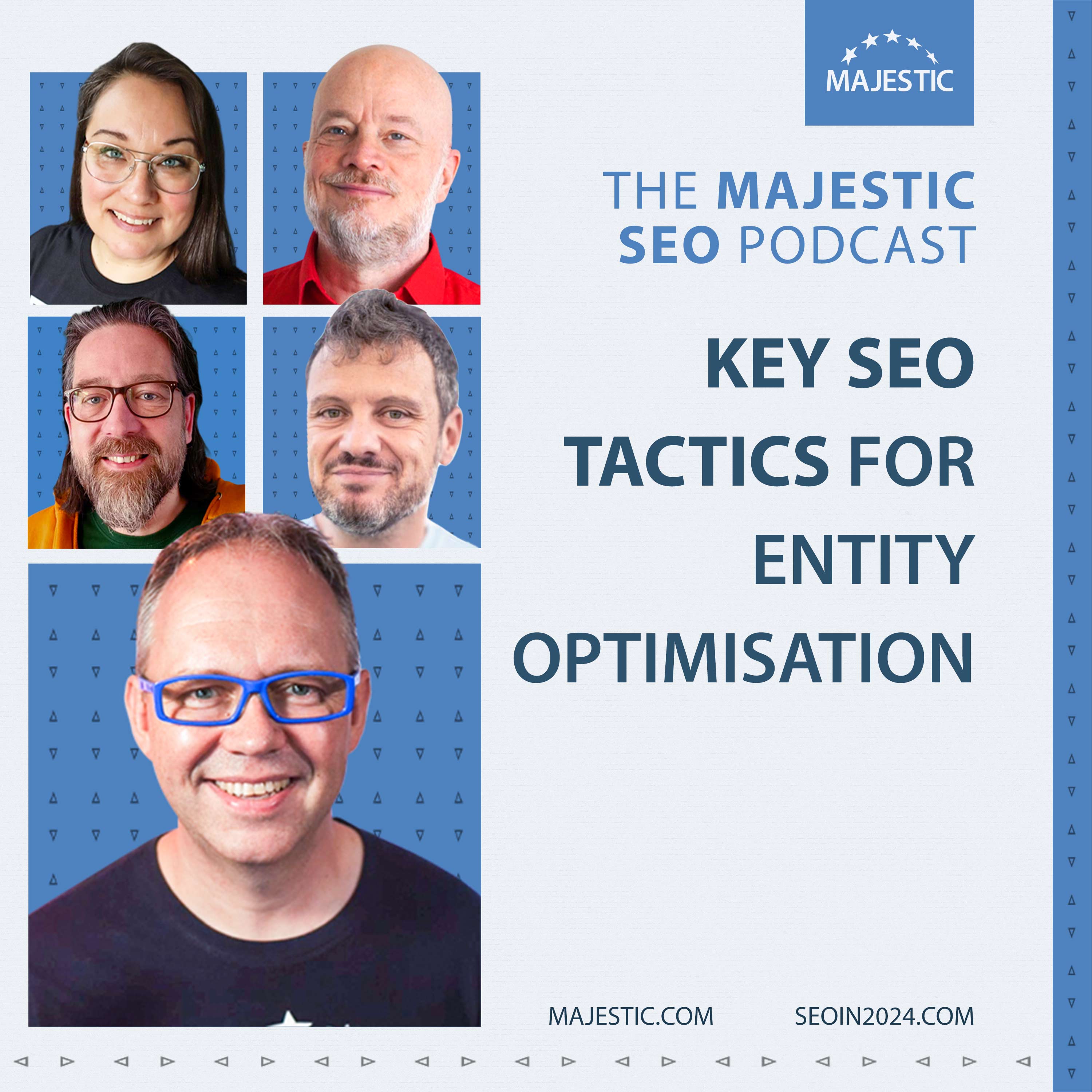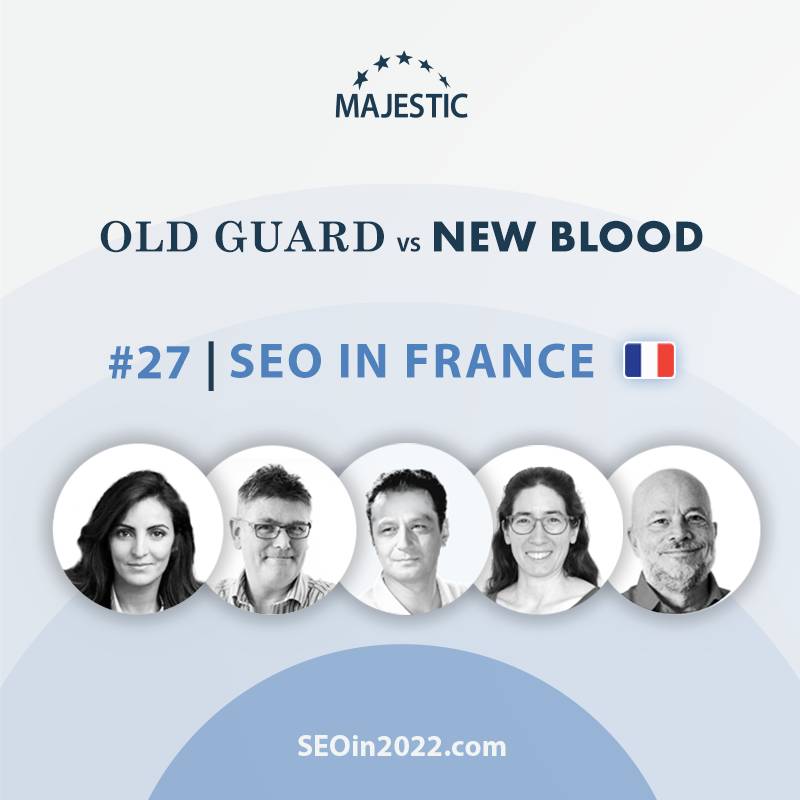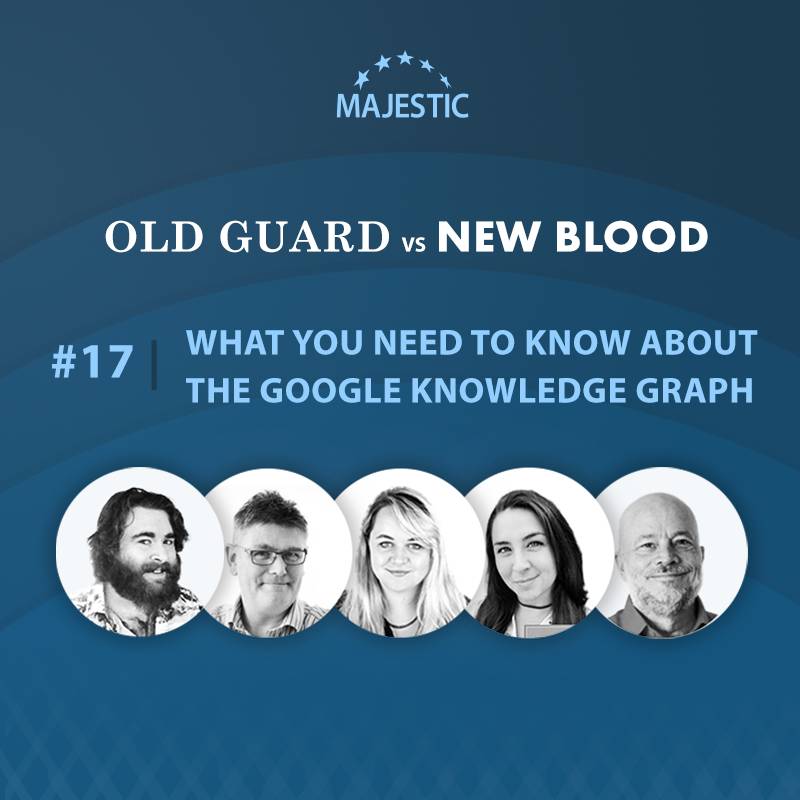-
Site Explorer
- Majestic
- Summary
- Ref Domains
- Backlinks
 New
New Lost
Lost- Context
- Anchor Text
- Pages
- Topics
- Link Graph
- Related Sites
- Advanced Tools
- Author ExplorerBeta
- Summary
- Similar Profiles
- Profile Backlinks
- Attributions
- Compare
-
Link Tools
- My Majestic
- Recent Activity
- Reports
- Campaigns
- Verified Domains
- OpenApps
- API Keys
- Keywords
- Keyword Generator
- Keyword Checker
- Search Explorer
- Link Tools
- Bulk Backlinks
- Neighbourhood Checker
- Submit URLs
- Experimental
- Index Merger
- Link Profile Fight
- Mutual Links
- Solo Links
- PDF Report
- Typo Domain
- Free SEO Tools
- Support
Turn your attention to entity optimisation
Jason Barnard
To kick off our deep dive into entities, Jason Barnard from Kalicube breaks down how and why you need to optimize your entities in 2025 – from the content itself to the creator and the publisher.

Turn your attention to entity optimisation
Jason says: “You need to focus on Entity Optimization for EEAT, or what we at Kalicube call NEEATT.”
Entity Optimization starts with entity understanding, is that correct?
“Yes, 100%. Without entity understanding, there is no basis for EEAT. It is essential that you ensure Google understands who the creator or publishing entity behind the content you publish is. Without that understanding, EEAT means nothing.”
What do the N and extra T stand for?
“N stands for Notability. Google doesn’t talk about Notability, but a little bit of famousness always helps you – in Google’s mind and in your audience’s.
If you want to get to the top of any lists or be the priority for anyone, you need at least a little bit of notability. The other T is Transparency. If you’re not transparent about yourself, nobody will trust you – including Google.”
Why is notability different to expertise?
“It’s about being famous for your expertise rather than just being an expert.
Somebody might have the same expertise as Jason Barnard, but not be as present online as Jason Barnard, so I could have a higher level of notability in the SEO industry than somebody else with an equivalent level of expertise. They know as much as I do, they’re simply not out there being recognised.
In addition, it is important to think in terms of niche notability. A lot of people look at Wikipedia and think that is the measurement. It isn’t. Wikipedia has strict notability guidelines that reflect society as a whole and 99.9% of humanity doesn’t deserve a Wikipedia page. Google appreciates Wikipedia famousness, but it rewards niche famousness more.”
Why is transparency so important?
“Confident understanding of the entity is step #1. Without that, you haven’t even started with the benefits of Entity Optimization. We find, especially in SEO, that websites often don’t have very clear identification of who is behind the website - which company or person is behind the website.
If you’re not transparent about that, you’re going to lose the game in the long term, with your human audience and with Google.”
What are the 3 tiers of SEO?
“The first tier is what I would call traditional SEO. It’s what we’re all doing (and have been doing for 28 years, in my case). That’s content and website-level optimization: the content itself, site speed, incoming links, internal linking, the structure of your website, and all of the things that we do in traditional SEO. Optimizing the content is something we need to keep doing.
But that is just one-third of the work you need to do to stay ahead in the SEO game. You need to add two new tiers to your SEO skillset.
Tier #2 is optimizing the content creator. Who is the content creator? Google’s Quality Rater Guidelines talk a lot about authors and content creators. When Google can understand who created the content it adds additional ways for it to measure the credibility and usefulness of the content, by measuring the credibility of the content creator.
Tier #3 is the publisher. Who published the content? Obviously, the website doesn’t publish content in isolation. It’s a platform on which content is published by a person or a company. Google’s Quality Rater Guidelines talk a lot about the website publisher. When Google can understand who published the content it adds additional ways for it to measure the credibility and usefulness of the content, by measuring the credibility of the content publisher.
The company or person who publishes the content is vouching for it. Are they credible?”
Does that mean EEAT (or NEEATT) is measured at 3 levels?
“Yes. EEAT (or, more accurately, NEEATT) is measured at three levels: content, author, and publisher.”
Which of those tiers requires Entity Optimization?
“All of them.
Tier #1 is traditional content-level SEO. Here, simply stick to the ‘usual’ techniques, tactics, and strategies.
Tier #2 is content creator/author Entity Optimization. This requires a different approach and a new toolkit. We need to ensure Google understands who created the content and convince it that they are NEEATT credible.
Tier #3 is website owner/publisher Entity Optimization. We need to ensure Google understands who published the content and convince it that they are NEEATT credible.
Your competitors will implement strategies to optimize for tiers 2 and 3 (content creator and publisher Entity Optimization). Don’t get left behind.”
Is Google going to get more comfortable with what your website represents and what your entity is about with Entity Optimization?
“It’s the same question as: “Do we need SEO”? Of course.
SEO is simply packaging for Google and Bing. They always appreciate your help. As SEOs, our job is to help the bots by packaging the content, the content creator, and the publisher.
There are always opportunities to package content creator and publisher better for Google, and therefore draw more advantage from whatever NEEATT credibility signals they have in addition to your content optimization.”
What are the key ways that you optimize for authors/content creators and website owners/publishers?
“Author and content creator optimization is more or less the same as it is for the website publisher. The aim is to improve Google’s depth, breadth, and confidence in its understanding of who the entity is, its area of authority, and who it serves.
Entity Optimization has become a real thing in SEO. I created Kalicube back in 2015, and I created Kalicube Pro, which is our database and proprietary algorithm for analysing Google search results, LLMs and Google’s Knowledge Graph API. It helps us learn how Google understands entities and how we can change its perception of those entities. Kalicube Pro is an Entity Optimization machine, and I created it in 2015 because I believed Google when they said they had moved ‘from strings to things’. We now have over 3 billion data points: nobody outside Google has more data about its understanding of entities/things.
Turns out, I had to wait 9 years for them to catch up. They couldn’t actually do it back then. Now Google does understand things and has moved away from strings, Kalicube Pro is truly useful because it actually does something that affects Google’s algorithms deep down. It’s especially powerful with Google Gemini, Google Learn About, and other AI engines such as ChatGPT, Perplexity, and even Alexa, Meta AI and Siri.
The key to all of them is always the same. They use the same data source - the web - they use the same technologies - LLMs, knowledge graphs and search results - and they all have the same goal - help people get to the solution to their problem as efficiently as possible.
I created the Kalicube Process to give structure to optimizing entities for Search and AI, and I built Kalicube Pro to automate that process.
First, you create an Entity Home - a place that Google, ChatGPT, Bing, Perplexity, etc. understand is the single source of truth from the entity about itself. As an author, content creator, or website publisher, you need one page you control where you present the facts about who you are, what you’re doing, and which audience you serve. The Entity Home is the hub.
That provides the bots and algorithms from all the BigTech with your version of the facts. That is your hub. You must then go around the web, find all the other resources about you, and ensure they corroborate that information. These resources are the wheel.
You can then link from the hub to all the relevant places on the wheel, and back if possible. That hub, spoke, and wheel is the secret sauce to Entity Optimization.”
Where would you recommend appearing, to corroborate that information?
“The mix is different for every single entity. It depends on the digital footprint of the entity, its history, and its niche. However, there are some resources that will always be needed.
Number 1 is all of your own websites (first party). Be consistent across your owned sources and link between them intelligently.
Number 2 is all of your social media channels. They’re what I call ‘second party’. You control the content of the page, but you don’t control the platform.
Number 3 is all the independent third-party resources. In SEO, that would be Search Engine Land and Search Engine Journal. For a journalist, it would be Muck Rack. A lawyer would need to optimize Justicia.com.
One size definitely does not fit all for any of the three types of resources. Some first-party websites will help, and some won’t. Some social media platforms are more powerful in some industries than others. Each industry has its big hitters.
Data is key here. I have developed Kalicube Pro specifically to be able to identify the most powerful resources for any entity and, as I said, they are never the same for two entities, even in the same niche.”
What are the steps once you have identified these sources?
“What you would then do is link from your Entity Home – the webpage that you own – out to all of the most powerful sources that confirm your message. That will say to Google, ‘Over there, the same thing is being said about me, either by myself or a third party.’
Then, if possible, link from those resources back to the Entity Home so that Google can go out to the corroboration and back to the Entity Home, out to the next corroboration, back to the Entity Home… consistently seeing the same consistent information about who you are, what you do, and which audience you serve.
If you do that right, you’ll create the ‘infinite loop of self-corroboration’ that is key to Entity Optimization.”
Do you have to continually update the Entity Home to demonstrate that the entity is evolving and getting more authoritative over time?
“Yes. People often forget that we change, the world changes, and algorithms change. That means you need to keep your Entity Home up to date.
This is definitely not a set-it-and-forget-it strategy. Your initial work will set clear, consistent, and accurate information. You need to check, correct, and adapt once a month, every month, year after year - if you fail to maintain that clarity, accuracy, and consistency over time, the optimization can fall apart unexpectedly at any moment.
There are thousands of moving parts, and dozens of people involved in making the changes. Expect this to take a year: you need to create the content for the Entity Home, add it to the site, figure out what needs changing across hundreds or thousands of platforms that mention the brand, devise a strategy to join all the dots, get the changes implemented by all the stakeholders… and then you need to give Google several months’ time to digest the information and apply the changes in its algorithms.
Following our Kalicube Process, you can compress that down to 3 months.
Once you have set ultra solid foundations you need to continue to update it on a monthly basis since you will change your own footprint (more profiles, more content, etc.) your market will change (your competitors will react, your audience will post information about you, your PR will work, journalists will write about you, etc.) and Google’s algorithms will evolve.”
Is this for both content creator optimization and website owner optimization?
“It’s the same for both, and both are equally important.
Content creators tend to be helped most by author-focused resources such as Muck Rack, Search Engine Land, Search Engine Journal, Forbes.com, and Entrepreneur.com.
Corporate Website Publishers will be helped more by other sources such as Crunchbase, DnB, theorg.com etc.
A note on the Wikis: Wikipedia and Wikidata are losing their influence. They are great for quick wins but don’t count on them long-term. They are too generalist. In addition, within our industry, they are a double-edged sword. It is a mistake to focus on them. The Wikidata and Wikipedia editors are very sensitive to manipulation of their platforms for marketing - they tend to delete anything that they feel is coming from the marketing industry.
Be VERY cautious. If you put something in Wikidata or Wikipedia and it’s then deleted, it’s more difficult to recover from that than it is to optimize an entity from scratch without the Wikis. If you’re not sure the Wikidata page will stick, don’t create it.”
Does Entity Optimization assist with being discovered and included within AI search engines and tools?
“Yes. All of these machines function in a very similar manner. They have LLMs, which are huge amounts of text information that allow them to create answers, content, and solutions based on probability, but they can’t fact-check.
So, they all use knowledge graphs to fact-check, and they are not up to date, so they use search to give fresh information.
You have no choice. You absolutely must optimize for the LLM, knowledge graph, and search in tandem. Spend a few minutes researching your brand on platforms such as Google Learn About, ChatGPT search, Bing Copilot, and Perplexity and you will quickly see that you need to optimize for all three.”
Can you state simply what we need to do for Entity Optimization?
“First, understandability: create a consistent message so that the knowledge graphs understand and the LLMs can repeat what you’re saying. That gives you control.
Second, credibility: communicate that you are a trustworthy, authoritative solution that is the most credible solution to the problem you solve. That gives you influence.
Third, deliverability: create the content that your audience needs and the machines can use and publish in the most appropriate places. That gives you visibility.”
If an SEO is struggling for time, what should they stop doing right now so they can spend more time doing what you suggest in 2025?
“Continue to optimize content – that is tier #1 of SEO in 2025 – but you need to reduce your efforts on page speed, keyword counting, and link building and use the time and resources you save there to optimize tiers #2 and #3: the content creator and the content publisher.”
Jason Barnard is CEO at Kalicube, and you can find him over at Kalicube.com.
Also with Jason Barnard
Choose Your Own Learning Style
 Video
Video
If you like to get up-close with your favourite SEO experts, these one-to-one interviews might just be for you.
Watch all of our episodes, FREE, on our dedicated SEO in 2025 playlist.
 Podcast
Podcast
Maybe you are more of a listener than a watcher, or prefer to learn while you commute.
SEO in 2025 is available now via all the usual podcast platforms
Don't miss out
Opt-in to receive email updates.
It's the fastest way to find out more about SEO in 2025.
Could we improve this page for you? Please tell us










